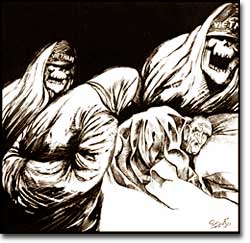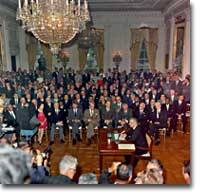56e. Lyndon Johnson's "Great Society"

This 1968 political cartoon captures the struggle of Lyndon B. Johnson's time as President. While Johnson dreamed of a "Great Society," his presidency was haunted by the specter of Vietnam. Much of the funding he hoped to spend on social reforms went towards war in southeast Asia.
Lyndon Baines Johnson moved quickly to establish himself in the office of the Presidency. Despite his conservative voting record in the Senate, Johnson soon reacquainted himself with his liberal roots. LBJ sponsored the largest reform agenda since Roosevelt's New Deal.
The aftershock of Kennedy's assassination provided a climate for Johnson to complete the unfinished work of JFK's New Frontier. He had eleven months before the election of 1964 to prove to American voters that he deserved a chance to be President in his own right.
Two very important pieces of legislation were passed. First, the Civil Rights Bill that JFK promised to sign was passed into law. The Civil Rights Act banned discrimination based on race and gender in employment and ending segregation in all public facilities.

Republican Barry Goldwater attempted to unseat Lyndon Johnson in the 1964 election but was soundly defeated. This bumper sticker combines the chemical symbols for "gold" (Au) and "water" (H20) to create a whimsical and memorable campaign slogan.
Johnson also signed the omnibus Economic Opportunity Act of 1964. The law created the Office of Economic Opportunity aimed at attacking the roots of American poverty. A Job Corps was established to provide valuable vocational training.
Head Start, a preschool program designed to help disadvantaged students arrive at kindergarten ready to learn was put into place. The Volunteers in Service to America (VISTA) was set up as a domestic Peace Corps. Schools in impoverished American regions would now receive volunteer teaching attention. Federal funds were sent to struggling communities to attack unemployment and illiteracy.
As he campaigned in 1964, Johnson declared a "war on poverty." He challenged Americans to build a "Great Society" that eliminated the troubles of the poor. Johnson won a decisive victory over his archconservative Republican opponent Barry Goldwater of Arizona.
American liberalism was at high tide under President Johnson.
- The Wilderness Protection Act saved 9.1 million acres of forestland from industrial development.
- The Elementary and Secondary Education Act provided major funding for American public schools.
- The Voting Rights Act banned literacy tests and other discriminatory methods of denying suffrage to African Americans.
- Medicare was created to offset the costs of health care for the nation's elderly.
- The National Endowment for the Arts and Humanities used public money to fund artists and galleries.
- The Immigration Act ended discriminatory quotas based on ethnic origin.
- An Omnibus Housing Act provided funds to construct low-income housing.
- Congress tightened pollution controls with stronger Air and Water Quality Acts.
- Standards were raised for safety in consumer products.

The Civil Rights Act of 1964 was part of Lyndon B. Johnson's "Great Society" reform package — the largest social improvement agenda by a President since FDR's "New Deal." Here, Johnson signs the Civil Rights Act into law before a large audience at the White House.
Johnson was an accomplished legislator and used his connections in Congress and forceful personality to pass his agenda.
By 1966, Johnson was pleased with the progress he had made. But soon events in Southeast Asia began to overshadow his domestic achievements. Funds he had envisioned to fight his war on poverty were now diverted to the war in Vietnam. He found himself maligned by conservatives for his domestic policies and by liberals for his hawkish stance on Vietnam.
By 1968, his hopes of leaving a legacy of domestic reform were in serious jeopardy.






